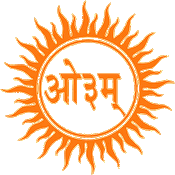
Arya Samaj is a monotheistic Indian Hindu reform movement that promotes values and practices based on the belief in the infallible authority of the Vedas. The samaj was founded by the sannyasi (ascetic) Dayanand Saraswati on 7 April 1875.
Brahmo Samaj is the societal component of Brahmoism, which began as a monotheistic reformist movement of the Hindu religion that appeared during the Bengal Renaissance.
Hindu law, as a historical term, refers to the code of laws applied to Hindus, Buddhists, Jains and Sikhs in British India. Hindu law, in modern scholarship, also refers to the legal theory, jurisprudence and philosophical reflections on the nature of law discovered in ancient and medieval era Indian texts. It is one of the oldest known jurisprudence theories in the world and began three thousand years ago whose original sources were the Hindu texts.

The Gujarat Freedom of Religion Act (2003) requires religious conversions in Gujarat, India, to be approved by a district magistrate.
Punjabi Hindus are adherents of Hinduism who identify linguistically, culturally, and genealogically as Punjabis and are native of Undivided Punjab region of Indian Subcontinent. While Punjabi Hindus are mostly found in the Indian state of Punjab today, many have ancestry from the greater Punjab region, an area that was partitioned between India and Pakistan in 1947, and apart from Indian Punjab they are well settled in the Indian states of Haryana, Himachal Pradesh, Uttarakhand, Delhi, Chandigarh, Rajasthan, Maharashtra etc.

Anand Karaj is the Sikh marriage ceremony, meaning "Act towards happiness" or "Act towards happy life", that was introduced by Guru Amar Das. The four laavaan were composed by his successor, Guru Ram Das. It was originally legalised in India through the passage of the Anand Marriage Act of 1909, but is now governed by the Sikh Reht Maryada that was issued by the Shiromani Gurdwara Prabandhak Committee (SGPC).
In law, severability refers to a provision in a contract or piece of legislation which states that if some of the terms are held to be illegal or otherwise unenforceable, the remainder should still apply. Sometimes, severability clauses will state that some provisions to the contract are so essential to the contract's purpose that if they are illegal or unenforceable, the contract as a whole will be voided. However, in many legal jurisdictions, a severability clause will not be applied if it changes the fundamental nature of the contract, and that instead the contract will be void; thus, often this is not explicitly stated in the severability clause.

The Arya Samaj was the first religious, cultural and educational Fiji Indian organisation established in Fiji. From its inception, in 1904, it attracted the young, educated and progressive Hindus into its fold. During the first three decades of the twentieth century, it was the sole voice of the Indian community in Fiji and as Fiji Indians won political rights, it was not surprising that first Indian members of the Legislative Council were all Arya Samajis. The influence of Arya Samaj over the Indians in Fiji gradually waned as other organisations representing Indians were established but it remained the dominant force in politics until 1959. The modern day Arya Samaj in Fiji still speaks out on issues affecting its members and its activities are visible through the numerous educational institutions that it manages.

This article summarizes the same-sex marriage laws of states in the United States. Via the case Obergefell v. Hodges on June 26, 2015, the Supreme Court of the United States legalized same-sex marriage in a decision that applies nationwide, with the exception of American Samoa and sovereign tribal nations.
Adi Dharm refers to the religion of Adi Brahmo Samaj the first development of Brahmoism and includes those Sadharan Brahmo Samajists who were reintegrated into Brahmoism after the second schism of 1878 at the instance of Hemendranath Tagore. This was the first organised casteless movement in British India and reverberated from its heart of Bengal to Assam, Bombay State, Punjab and Madras, Hyderabad, and Bangalore.

The Hindu Succession Act, 1956 is an Act of the Parliament of India enacted to amend and codify the law relating to intestate or unwilled succession, among Hindus, Buddhists, Jains, and Sikhs. The Act lays down a uniform and comprehensive system of inheritance and succession into one Act. The Hindu woman's limited estate is abolished by the Act. Any property possessed by a Hindu female is to be held by her absolute property and she is given full power to deal with it and dispose it of by will as she likes. Parts of this Act was amended in December 2004 by the Hindu Succession (Amendment) Act, 2005.

The Hindu Widows' Remarriage Act 1856, also Act XV, 1856, passed on 16 July 1856, legalised the remarriage of widows in all jurisdictions of India under East India Company rule.The act was enacted on 26 July 1856. It was drafted by Lord Dalhousie and passed by Lord Canning before the Indian Rebellion of 1857. It was the first major social reform legislation after the abolition of sati pratha in 1829 by Lord William Bentinck.
The Hindu Adoptions and Maintenance Act (HAMA) was enacted in India in 1956 as part of the Hindu Code Bills. The other legislations enacted during this time include the Hindu Marriage Act (1955), the Hindu Succession Act (1956), and the Hindu Minority and Guardianship Act (1956). All of these acts were put forth under the leadership of Jawaharlal Nehru, and were meant to codify and standardise the current Hindu legal tradition. The Adoptions and Maintenance Act of 1956 dealt specifically with the legal process of adopting children by a Hindu adult, and with the legal obligations of a Hindu to provide "maintenance" to various family members including their wife or parents, and in-laws.
The Hindu code bills were several laws passed in the 1950s that aimed to codify and reform Hindu personal law in India, abolishing religious law in favor of a common law code. Following India's independence in 1947, the Indian National Congress government led by Prime Minister Jawaharlal Nehru completed this codification and reform with the help of B. R. Ambedkar. This process was started during the British rule of India. According to the British policy of noninterference, personal-law reform should have arisen from a demand from the Hindu community. That was not the case, as there was significant opposition from various Hindu politicians, organisations and devotees; they saw themselves unjustly singled out as the sole religious community whose laws were to be reformed. However, the Nehru administration saw such codification as necessary to unify the Hindu community, which ideally would be a first step towards unifying the nation. They succeeded in passing four Hindu code bills in 1955–56: the Hindu Marriage Act, Hindu Succession Act, Hindu Minority and Guardianship Act, and Hindu Adoptions and Maintenance Act. They continue to be controversial to the present day among women, religious, and nationalist groups.
The Hindu Marriage Act is an Act of the Parliament of India enacted in 1955 which was passed on 18th of May. Three other important acts were also enacted as part of the Hindu Code Bills during this time: the Hindu Succession Act (1956), the Hindu Minority and Guardianship Act (1956), the Hindu Adoptions and Maintenance Act (1956).

The Singh Sabha Movement was a Sikh movement that began in Punjab in the 1870s in reaction to the proselytising activities of Christians, Hindu reform movements and Muslims. The movement was founded in an era when the Sikh Empire had been dissolved and annexed by the British, the Khalsa had lost its prestige, and mainstream Sikhs were rapidly converting to other religions. The movement's aims were to "propagate the true Sikh religion and restore Sikhism to its pristine glory; to write and distribute historical and religious books of Sikhs; and to propagate Gurmukhi Punjabi through magazines and media." The movement sought to reform Sikhism and bring back into the Sikh fold the apostates who had converted to other religions; as well as to interest the influential British officials in furthering the Sikh community. At the time of its founding, the Singh Sabha policy was to avoid criticism of other religions and political matters.
During the British Colonial regime, the position of a non-Buddhist husband and Myanmar Buddhist wife was very unfavorable. While there is no provision in the Dhammathats that a Buddhist woman cannot marry another religious man, in this period, the Buddhist woman who married a non-Buddhist man almost lost her rights to divorce, inheritance, succession and their child's legal status. Almost all matters of divorce, inheritance, succession, partition and guardianship of children were decided by a foreign judge.
Below is a timeline of Adi Dharm or Adi Brahmo Samaj.
Sanātanī (सनातनी) is a term used to describe Hindu duties that incorporate teachings from The Vedas, The Upanishads, and other Hindu religious texts and scriptures such as The Ramayana and The Bhagavad Gita, which itself is often described as a concise guide to Hindu philosophy and a practical, self-contained guide to life. The word sanatani is coined from Sanātana Dharma which refers to the idea that its origins lie beyond human history, as revealed in the Hindu texts.
Tamil Nadu does not recognise same-sex marriages or civil unions.








